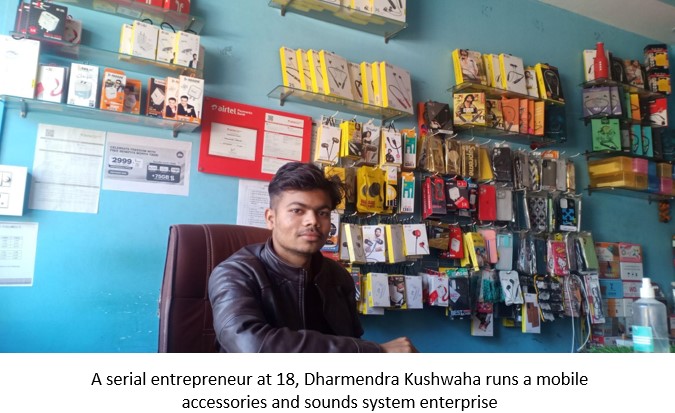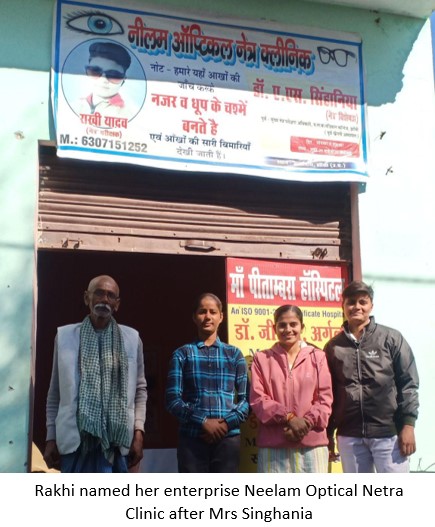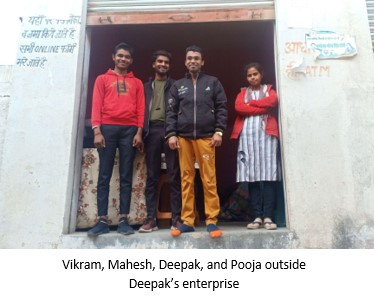Yuva Pidi Ko Businesswale Kaun Bana Rahe Hain?
(Who is Shaping the Young
Generation into Entrepreneurs?)
'I am interested
in setting up my own business but I do not know how.’
‘I assisted my uncle in his mobile accessories shop for three years and
opened my own shop last year.’
‘Family ne meri business ko pehle support nahi kiya.’
Rakhi Yadav, 20, knew early on that she wanted to set up her own business. After completing schooling, she apprenticed at a reputed optician’s clinic in the heart of Ambabai village in Niwari district. This was her first foray into the world of entrepreneurship, the stepping stone to becoming the first business wala from the Yadav family.
 Likewise,
Dharmendra Kushwaha,
18, learned the ropes of business while assisting his 25-year-old uncle, Ram
Singh Kushwaha, at his mobile repair shop. Dharmendra is pursuing his first
year of college. He manages his mobile accessories business alongside his
studies by employing an assistant to man the shop while he is away.
Likewise,
Dharmendra Kushwaha,
18, learned the ropes of business while assisting his 25-year-old uncle, Ram
Singh Kushwaha, at his mobile repair shop. Dharmendra is pursuing his first
year of college. He manages his mobile accessories business alongside his
studies by employing an assistant to man the shop while he is away.
In the Niwari and Jhansi villages of Bundelkhand, the youth, particularly those pursuing a college education, are hustling for financial independence, identity, and purpose. These aspirations are being fulfilled through the culture of entrepreneurship, which has woven itself into the progression graph of 15−25-year-olds seeking a means to an end, where being an entrepreneur is a defined end for most of them. For a region where ‘entrepreneurship’ was hardly thought of or even talked about as a mainstream job, Niwari has become a hub of entrepreneurial activity today where two enterprises are set up on average in 48 villages every day.1
What is this ‘culture’ that is being talked about and what is shaping it? How much does this say about entrepreneurship being a choice? Is there a support system that has played a hand in shaping the aspirations of young people to become an entrepreneur? These are some of the questions that the youth of Niwari and Jhansi villages can answer.
 Dharmendra says that when he was
growing up, his uncle Ram Singh influenced his views on business. What
little he knows about running a business is because of Ram Singh. Dharmendra
excitedly shows the business card that has ‘DJ Dahshat Niwari Pipra’ printed
boldly on it. It is the name of the enterprise that he is running along with
his uncle. They even have a YouTube channel called
DJ Om Sai King of Niwari
where they upload their music. In the future, they plan to create a USP for
the business by investing in quality audio devices. Hope and gratitude
glimmer in Dharmenda’s eyes as he talks about it, a sentiment echoed
strongly through his shop called ‘Radhika Mobiles’, named after Ram
Singh's daughter.
Dharmendra says that when he was
growing up, his uncle Ram Singh influenced his views on business. What
little he knows about running a business is because of Ram Singh. Dharmendra
excitedly shows the business card that has ‘DJ Dahshat Niwari Pipra’ printed
boldly on it. It is the name of the enterprise that he is running along with
his uncle. They even have a YouTube channel called
DJ Om Sai King of Niwari
where they upload their music. In the future, they plan to create a USP for
the business by investing in quality audio devices. Hope and gratitude
glimmer in Dharmenda’s eyes as he talks about it, a sentiment echoed
strongly through his shop called ‘Radhika Mobiles’, named after Ram
Singh's daughter.
But not everyone is fortunate enough to receive support from their family on their road to an entrepreneurial journey. Rakhi herself says ‘My best friend and her mother were my pillars. They understood my dreams when my family could not. I was also fortunate to find mentorship in Dr Singhania and his wife. They guided me in setting up the enterprise’.
Rakhi’s optical enterprise provides a range of quality eye frames that she sources from Lucknow. She calmly adds, ‘People here hesitate to wear spectacles because they consider it a sign of weakness, but slowly they have also come to understand the importance of eye health and I am happy to provide these services to them’. Rakhi’s next milestone is to secure a diploma in Optometry and enhance her skills and enterprise offerings.

Another dynamic entrepreneur,
Deepak Banshkar, 23, from Niwari runs a Common Service Centre (CSC) and has
trained several youths in digital literacy. Mahesh, 22 and Pooja, 22, are
learning the A-Zs of setting up a CSC enterprise from Deepak. Even Deepak’s
14-year-old brother, Vikram, shyly expresses his interest in becoming a
digital entrepreneur like his brother.
Along with support from family, peer-to-peer exchange of knowledge, or simply having the space, whether physical or digital, to exchange conversations on shared interests and values around entrepreneurship can accelerate the existing behavioural shifts in the local ecosystem. Innumerable possibilities exist in designing and co-creating solutions with the community; this may be in the form of a podcast to listen to and share experiences or maybe customised interactive sessions with family, peers, stakeholders to understand their role in shaping an entrepreneur. Maybe and maybes!
‘It is only when you do that you will know’ remind Rakhi and Deepak, a knowing gem from their experiences. Words that (should) speak to each of us every day in some form and shape.
Endnote
1 Data from Work4Progress India Programme, December 2022
Suneptula S Jamir
ssjamir@devalt.org